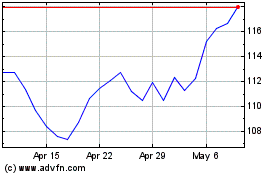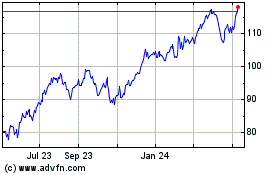American workers putting more thought into choosing annual benefits, new Prudential survey shows
24 September 2019 - 10:00PM
Business Wire
Almost two-thirds of American workers did not automatically
choose the same benefits as the previous year, indicating they are
putting more thought into their choices during open enrollment,
“Employee Insights on Open Enrollment," a new survey released by
Prudential Financial (NYSE: PRU) today shows.
This press release features multimedia. View
the full release here:
https://www.businesswire.com/news/home/20190924005358/en/
(Graphic: Business Wire)
The survey of 2,000 employed adults, conducted by Morning
Consult on behalf of Prudential, found that just 35% of working
adults chose the same benefits as the previous year. Further, those
who took on a new job, an elevated role, or received a raise were
even more likely to select new benefits. In most cases, the 65% who
chose new benefits credited their employer for using a variety of
communication methods to keep them informed.
“Now the next big opportunity for employers is to think about
how to tailor those communications for populations most likely to
need them such as new employees, employees in new roles, employees
who received a raise or promotion, and those likely to experience a
life change,” said Leston Welsh, head of products at Prudential
Group Insurance.
Even the 35% who chose the same benefits made an informed
decision rather than simply checking the same boxes for
convenience, according to the survey. Of those choosing the same
benefits, 74% said they did so because they believed those benefits
were still appropriate for them. However, those who selected new
benefits were more likely to say their benefits reduced their
financial stress (79%) than those who selected the same benefits as
the previous year (62%).
American workers comfortable with automatic
enrollment
A majority of American workers (58%) also said that if
auto-enrolled in an insurance policy, they would likely keep it
rather than opt out. Just 5% said they would opt out, and 37% said
they would consider the cost before deciding whether to stick with
it.
While the findings suggest most individuals would be comfortable
with being defaulted into an insurance plan, there are still
misconceptions about insurance benefits that can affect their
decision making, Welsh explained.
“Many individuals assume that non-health insurance benefits cost
more than they actually do (e.g. the average annual premium for
voluntary critical illness insurance is $3251) and they are
hesitant to buy something they don’t think they will use,” Welsh
said.
“But the reality is that a serious illness will set most
Americans back financially much more than $325 if they don’t have
income protection in place. Auto-enrollment is a powerful tool that
can help ease uncertainty and take the pressure off during the
decision-making process.”
When offered by an employer, the non-health insurance benefits
most likely to be selected are life insurance (79%), accidental
death and dismemberment (AD&D) insurance (70%), short-term
disability (69%), long-term disability (65%), accident insurance
(63%), and hospital indemnity insurance (62%).
Methodology:
This poll was conducted by Morning Consult from August 27 - 28,
2019 among a national sample of 2,000 employed adults ages 18+
enrolled in at least 1 insurance benefit through their
employer. The interviews were conducted online and the data
were weighted to approximate a target sample of adults with based
on age, race/ethnicity, gender, educational attainment, and region.
Results from the full survey have a margin of error of plus or
minus 2 percentage points.
About Prudential Group Insurance
Prudential Group Insurance manufactures and distributes a full
range of group life, long-term and short-term disability and
corporate and trust-owned life insurance in the U.S. to
institutional clients primarily for use within employee and
membership benefit plans. The business also sells critical illness,
accidental death and dismemberment and other ancillary coverages.
In addition, the business provides plan and administrative services
in connection with its insurance coverages, and administrative
services for employee paid and unpaid leave, including FMLA, ADA
and PFL.
About Prudential Financial, Inc.
Prudential Financial, Inc. (NYSE: PRU), a financial wellness
leader and premier active global investment manager with more than
$1 trillion in assets under management as of June 30, 2019, has
operations in the United States, Asia, Europe, and Latin America.
Prudential’s diverse and talented employees help to make lives
better by creating financial opportunity for more people.
Prudential’s iconic Rock symbol has stood for strength, stability,
expertise and innovation for more than a century. For more
information, please visit news.prudential.com.
1026897-00001-00
1 “Voluntary Critical Illness Products 2019 Spotlight™ Report,”
Eastbridge Consulting Group, Inc. 2019.
View source
version on businesswire.com: https://www.businesswire.com/news/home/20190924005358/en/
MEDIA: Anjelica Sena 973-802-6930
anjelica.sena@prudential.com
Prudential Financial (NYSE:PRU)
Historical Stock Chart
From Mar 2024 to Apr 2024

Prudential Financial (NYSE:PRU)
Historical Stock Chart
From Apr 2023 to Apr 2024
